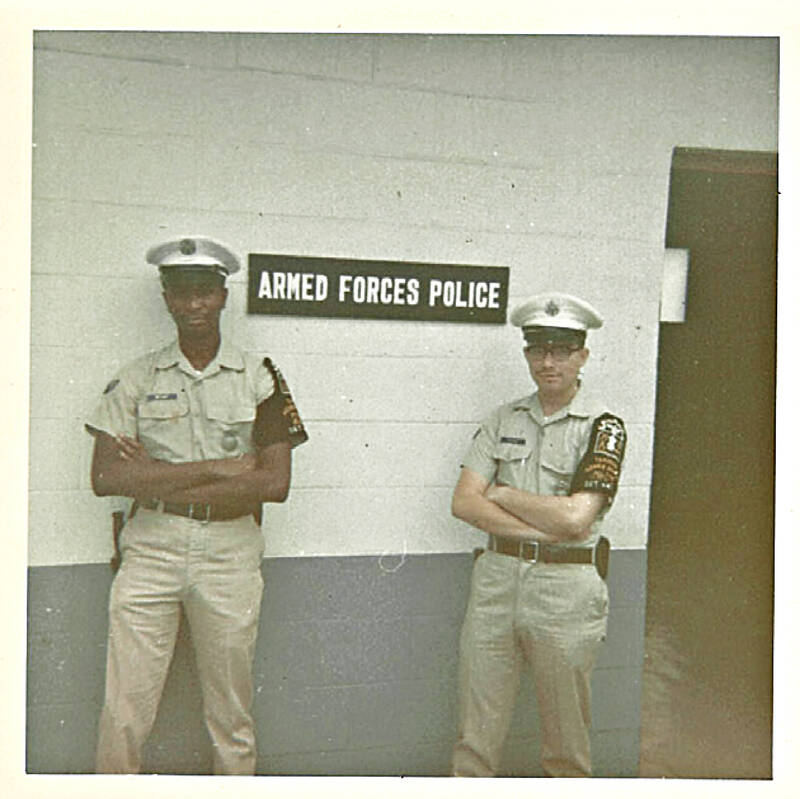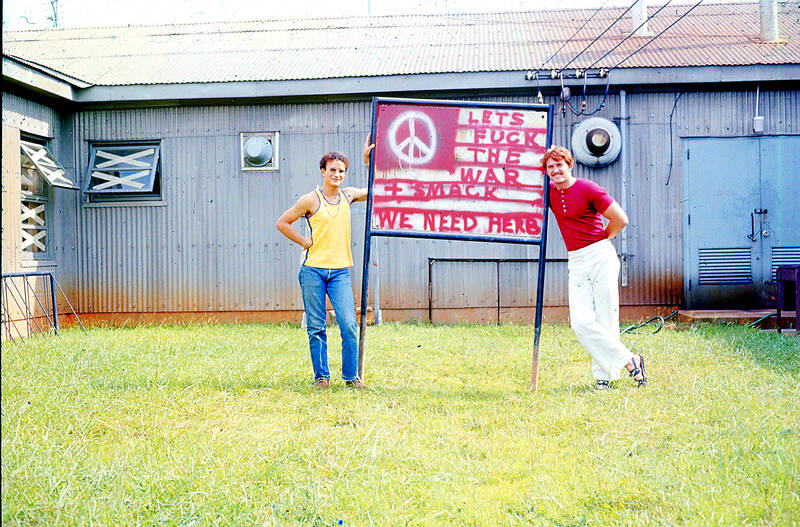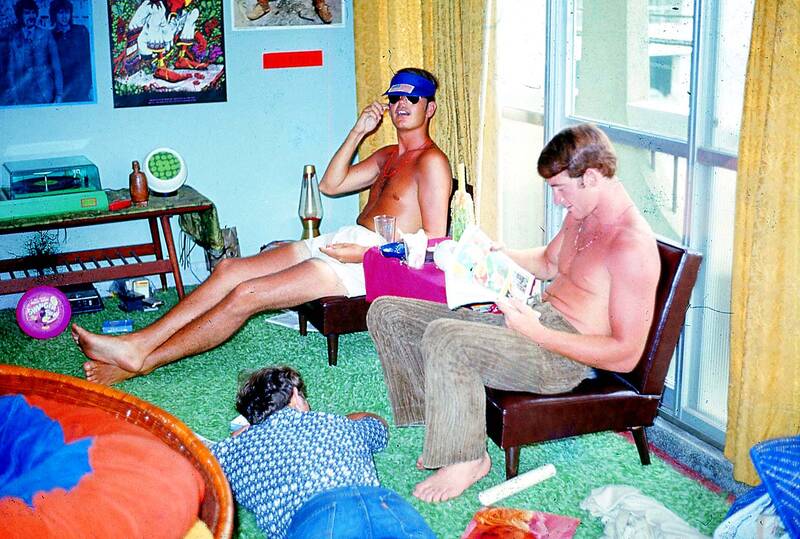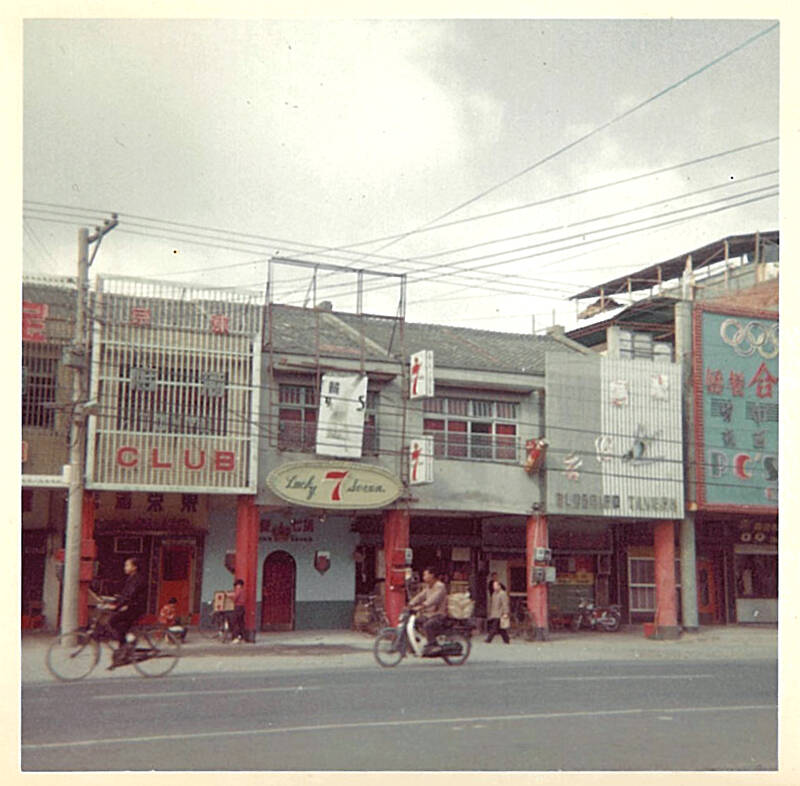By 1971, heroin and opium use among US troops fighting in Vietnam had reached epidemic proportions, with 42 percent of American servicemen saying they’d tried opioids at least once and around 20 percent claiming some level of addiction, according to the US Department of Defense. Though heroin use by US troops has been little discussed in the context of Taiwan, these and other drugs — produced in part by rogue Chinese Nationalist Party (KMT) armies then in Thailand and Myanmar — also spread to US military bases on the island, where soldiers were often stoned or high.
American military policeman Terrence “TC” Brown, who was part of the Air Force Security Police unit at CCK Air Base (清泉崗空軍基地) near Taichung, found himself in the thick of such impolitic facts of GI life during his two postings to Taiwan, which added up to about four years between 1968 and 1973.
In his newly published memoir, Made in Taiwan: A Naive American’s Chaotic Journey to Manhood in an Exotic Culture During Radical Times, Brown pulls back the carpet to reveal some of the unsightly detritus of the US military presence in Taiwan during the Vietnam years.

Some incidents, like an African-American civil rights protests of 1971 that engulfed the Taichung air base for days, have barely ever received public mention. In my own conversations with a few veterans, I’ve heard stories of racial tensions, including segregated GI bars in Taipei and a race riot that broke out during a USO performance by the soul group the Platters. But I’ve not seen anything in print until now.
Brown’s account of the radical 60s in Taiwan is not only unusually candid and wonderfully engaging, it is also very possibly the first ever to describe an American GI’s experience in Taiwan during the Vietnam War.
The US occupied military bases on Taiwan from 1950 to 1979 and the Vietnam era represented a peak in the number of troops on the island. Between 1965 and 1972, more than 200,000 servicemen rotated through Taiwan on weeklong R&R visits, pumping millions of US dollars into the local economy, much of that via mushrooming bar districts near bases in Taipei, Taichung and Kaohsiung. There were also around 10,000 permanent personnel, with the largest contingent of around 5,000 at CCK Air Base.

Photo courtesy of TC Brown
Brown, a native of Columbus, Ohio, arrived in Taiwan as fresh as they come. A church-going Catholic, he was “the personification of a fresh-faced, clean-cut lad,” and when he was posted to CCK at age 18, he was still a virgin who barely drank alcohol. But that all changed within 24 hours of his arrival in Taichung.
“Young,” “dumb” and racing like a dog in heat, Brown began his first night in Taichung by hopping on the “CCK Smoker” — the nickname GIs gave to the old diesel-engined bus for its billowing exhaust — and riding it from the air base to its terminus in downtown Taichung.
‘DIRTY DOZEN’

Photo courtesy of TC Brown
He debarked in front of “a raft of bars, one after the other, lining both sides of the roadway.” Known as the “Dirty Dozen,” this strip of Wuchuan Rd (五權路) stretched from Zhongqing Rd (中清路) — then called Daya Rd 大雅路 — to around Xueshi Rd (學士路) was “party central for many American airmen stationed at CCK,” Brown writes.
Under the neon signs of the Monte Carlo, the Playboy Bar and the Hollywood Club, “this midwestern boy from Columbus looked around in awe at this adult Disneyland.” The scene seemed to him an ersatz Las Vegas, and if it had “less glitziness,” it also had “more oddities.”
Shops there hawked everything GIs could want or need: tailored suits, teak and rattan furniture, wood carvings, pirated American records for NT$10 each.

Photo courtesy of TC Brown
Brown’s life-changing first night ended in a brothel in “a small, dank, incense-smelling, candle-lit bedroom with a cracker-thin mattress.” Afterwards, he and a buddy taxied back to CCK at dawn, just in time for the morning briefing and the first day on the job.
After a few months of guarding airplanes — C-130 cargo planes, KC-135 Stratotankers and occasionally a B-52 bomber — Brown was promoted to Town Patrol, a move that made the Dirty Dozen not only his party spot but also his regular beat. Bar fights were a near nightly occurrence. Hauling away blackout drunk GIs was routine.
The bar patrol, always colorful, occupied the meat of Brown’s Taichung tenure. But he also investigated the case of a serviceman found dead in rice paddies halfway between Taipei and Taichung (drunk, the man had attempted to ride on top of a train and fallen off), survived typhoons and got engaged to a bar girl, only to break it off after discovering her in bed with another man.

Photo courtesy of TC Brown
During a yearlong posting in Vietnam at Bien Hoa Air Base, Brown also weathered rocket attacks and tagged along on risky helicopter resupply missions.
DRUGS, DRUGS, EVERYWHERE
Most eye-opening in regards to Taiwan, however, are Brown’s descriptions of the widespread availability of drugs on US bases at a time when drug use in Taiwanese society was negligible and smuggling was punishable by death.
Brown himself began smoking weed in the wake of his broken engagement. By 1973, he and his crew of security police — able to live off base as part of the Town Patrol — spent free days blasting the Moody Blues on Japanese stereo systems “while getting high in a room filled with incense, lava lamps, Day-Glo posters and black lights.”
“Marijuana flowed into CCK like beer flowing freely out of an open tap,” he writes, describing his first years on the base. The weed was mostly smuggled in on C-130s on regular flights from Vietnam or Thailand, where the drug was cheap and plentiful. Base security police, who were also the customs agents, included tokers like Brown who were all too ready to give weed shipments a blind eye.
“The music (and weed) helped carry us to a place where… the love of living and life erased the dark angst or pain of the war,” Brown writes.
Marijuana became so pervasive at CCK that in 1971 base commanders began using drug sniffing dogs to search incoming planes. But this had unanticipated and deadly results — a spike in heroin use. The dogs could smell marijuana far more easily than heroin, and as the weed dried up, jonesing “heads” began experimenting with the harder and deadlier opioid. A group of airmen even protested to base commanders that the marijuana crackdown was inviting disaster. Brown argues that their warning was correct, but the brass ignored it and heroin use continued to spread.
In the introduction, Brown tells how he’d struggled for decades over how to tell these stories before finally, now aged 75, settling on a memoir. In a few odd moments, his account feels like the confession of a lapsed Catholic or the inventory taking of a life. The stories are always told at ground level, never in the big picture or from the bird’s eye, and many of the details have been smoothed over by time and memory. But on the whole, Brown, who went on to become a journalist, is a vivid storyteller and a pleasure to read. With Made in Taiwan, he delivers a rare and compelling record of how American enlisted men in Taiwan lived, partied and stretched the US military at the seams during the Vietnam War.

Google unveiled an artificial intelligence tool Wednesday that its scientists said would help unravel the mysteries of the human genome — and could one day lead to new treatments for diseases. The deep learning model AlphaGenome was hailed by outside researchers as a “breakthrough” that would let scientists study and even simulate the roots of difficult-to-treat genetic diseases. While the first complete map of the human genome in 2003 “gave us the book of life, reading it remained a challenge,” Pushmeet Kohli, vice president of research at Google DeepMind, told journalists. “We have the text,” he said, which is a sequence of

On a harsh winter afternoon last month, 2,000 protesters marched and chanted slogans such as “CCP out” and “Korea for Koreans” in Seoul’s popular Gangnam District. Participants — mostly students — wore caps printed with the Chinese characters for “exterminate communism” (滅共) and held banners reading “Heaven will destroy the Chinese Communist Party” (天滅中共). During the march, Park Jun-young, the leader of the protest organizer “Free University,” a conservative youth movement, who was on a hunger strike, collapsed after delivering a speech in sub-zero temperatures and was later hospitalized. Several protesters shaved their heads at the end of the demonstration. A

Every now and then, even hardcore hikers like to sleep in, leave the heavy gear at home and just enjoy a relaxed half-day stroll in the mountains: no cold, no steep uphills, no pressure to walk a certain distance in a day. In the winter, the mild climate and lower elevations of the forests in Taiwan’s far south offer a number of easy escapes like this. A prime example is the river above Mudan Reservoir (牡丹水庫): with shallow water, gentle current, abundant wildlife and a complete lack of tourists, this walk is accessible to nearly everyone but still feels quite remote.

In August of 1949 American journalist Darrell Berrigan toured occupied Formosa and on Aug. 13 published “Should We Grab Formosa?” in the Saturday Evening Post. Berrigan, cataloguing the numerous horrors of corruption and looting the occupying Republic of China (ROC) was inflicting on the locals, advocated outright annexation of Taiwan by the US. He contended the islanders would welcome that. Berrigan also observed that the islanders were planning another revolt, and wrote of their “island nationalism.” The US position on Taiwan was well known there, and islanders, he said, had told him of US official statements that Taiwan had not